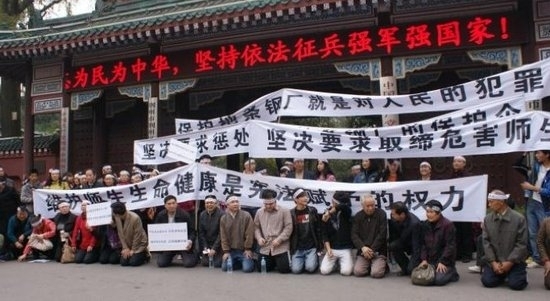

By Li Zhongshu (李忠庶)
Economic Observer Online
Nov 4, 2011
Translated by Laura Lin
Original article: [Chinese]

On November 1, several dozen professors from Yangtze University (长江大学) in Hubei Province knelt down in front of a local goverment building to plead for the closure of a small, heavily-polluting steel mill that is located right next door to their campus. Two days later, local officials cut power to the factory, halting its operation.
The fact that professors knelt down to the authorities has aroused quite a lot of attention in China. For many, it's difficult to understand this behavior, which risks undermining the particularly prestigious status held by professors in Chinese society. As the intelligentsia, they regard bowing down to the powerful and privileged as an act of shame. Some have explicitly called it: "knowledge bowing down before power" (知识向权力低头).
And yet, it was undeniably efficient. Resorting to this unusual means of protest attracted the media and the public's attention and consequently forced authorities to take action.
This is not the first time that people with a particular elevated status have pleaded for action in a conspicuous way and provoked a public reaction. Recent examples included protests by uniformed policemen in Shandong and prosecutors in Zhejiang. The common thread to all of these incidents is that the normal channels of petition hadn't worked, and people had been forced to take desperate measures to defend their rights.
Nevertheless, the incident is also a reminder that there are many ordinary folk who see their causes ignored, both by local authorities and the media. There are citizens kneeling down for days and months in front of courts or local government buildings in every corner of China, yet they rarely attract press attention.
Those unfortunate people whose houses have been wrecked, whose family members had been wrongfully jailed or misdiagnosed and disabled by incompetent hospitals certainly appear to have suffered more than these professors. Yet so few of them attract news coverage, let alone receive a speedy response from the government.
One can't help think of the case of Qian Mingqi (钱明奇), who blew up three local city government buildings in violent revenge last May. For a decade, authorities and the media had ignored his petition over the financial loss he suffered from the death of his wife indirectly caused by the forced relocation of his home.
These incidents demonstrate that any wronged soul should focus less on the grievance or the defense of one's rights than on the method for attracting attention. This explains why methods of protest are beginning to verge on to the level of performance art.
Nevertheless, though far from perfect, we can take comfort in the growing number of cases creating a public reaction. Indeed the number of stories that the media devotes to coverage of individual grievances, is one of the ways in which we can guage how democratic a society is and the health of its legal institutions.
News in English via World Crunch (link)
Links and Sources
Sohu: image
Want China Times: Jingzhou factory closure order goes unheeded
Global Times: Govt closes factory after protest

